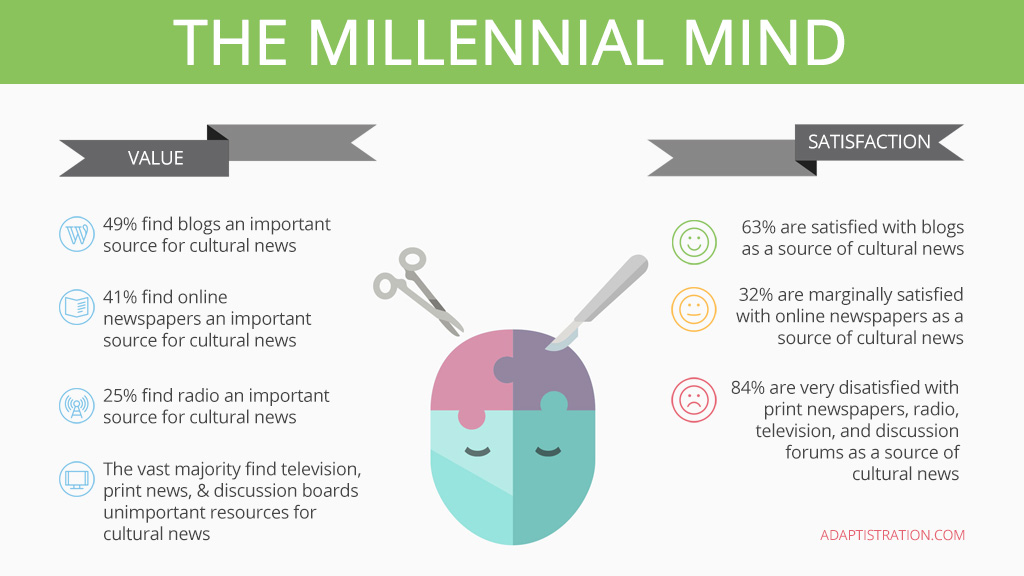Greg Sandow’s TAFTO contribution certainly garnered some of the most colorful responses of any submission. What I found most intriguing were the extremes to which people responded, some with appreciation and others with dissatisfaction.
Interestingly enough, however, almost all of the submissions had more in common than not; or they did in my opinion at least. Quite a few of the responses focused on the age based issues of Greg’s contribution whereas I construed any use of demographics to merely illustrate the breakdown on the part of the many orchestra organizations to create a more welcoming atmosphere for both regulars and newbies alike (regardless of age).
The fact that whether or not the existing patrons make newbies feel uncomfortable or not is really a symptomatic issue. Quite frankly, I think one of the largest target audiences for orchestras should be the baby-boomers (who certainly aren’t in their 20’s).
When taking baby boomers to their first orchestra concert, I’ve noticed they have some of the very same aversions to the general atmosphere as do 20 and 30 year olds. To me, this says that there’s much more going on with the sort of vibe emanating from orchestra concerts than anything having to do with age.
I also think the vibe isn’t necessarily generated by those who compose the current audience so much as those on the outside looking in see it that way. The only real “face” a concert has (besides the venue itself) is the audience; that’s where most patrons intersect with others on a close proximity basis anyway.
In reality, the vibe stems from the overall disconnect I think Greg did a good job alluding to toward the end of his contribution. And if TAFTO were to have a singular goal, it would be for those who already attend to help those who don’t overcome that inherent disconnect so they can realize and evaluate classical music on their own terms without all of the socio-economic interference.
Can orchestras help with this? Absolutely. Does it mean getting rid of the current audience? Of course not, that is just silly. Each answer will be defined by the environment which already exists in each respective orchestra operates. But the answers are there and they will all stem from the same root source; actively working to eliminate unconscious barriers which keep anyone from being involved.
But I digress; you’re obviously here to peruse the Reader Responses:
Reader Response #1
Excellent and true observations about the character of concerts today. However, one possible concertgoer was left out. That would be someone like myself, relatively young, but still fairly well-versed on classical music, the sort of educated audience member that used to be extremely common. I almost never go to concerts now because frankly, they don’t play anything I want to hear. I don’t care if it’s “the best band in the land”, if it’s Beethoven’s Missa Solemnis, I’m staying home. If it’s Flagello’s Missa Sinfonico, I’m there. It’s not just new music, it’s also recent music of the last hundred years that has been betrayed by the craven orchestras of today. As concert-goers and music consumers we have been largely denied the opportunity to have our ideas and perspectives shaped by the music of our contemporaries and near contemporaries, unlike the “concert consumers” of previous generations. They were lucky to live in an age when anticipation and reception of new work was a culturally central event of which no self-respecting middle-class intellectual would ever allow himself to be left out.
You’re correct about the lack of perspective conveyed to those who are less familiar with the trappings of a concert, but the orchestras themselves are not entirely to blame. Since the evisceration of arts education in the earliest grades of American learning began in the 70’s, it’s not a mystery why the majority are mystified by a classical concert. This added unto the daily media reinforcement of music as a commodity without any real philosophical value and you have a public that is otherwise intelligent, literate, able to converse about other arts and disparate topics, yet is ignorant of higher or concurrent developments in music, and filled with ennui at the prospect of being subjected to something lacking an insistent quasi march rhythm.
– Professional musician, John McLaughlin Williams
Reader Response #2
This constant criticism of aging audiences, the “blue-haired” argument, really offends me (I don’t have blue hair, nor am I all that old), because old people have a right to enjoy music like everyone else. To think of yourself as liberal-minded to the point of not caring about what people wear to a concert, or, by supporting more performances of new music, or, by encouraging applause whenever it feels good, as at a jazz concert, and then, to show such blatant prejudice against a group of people, in this case, the elderly, is to reveal the bigotry at work here.
Music is for everyone, at every age, from every sort of cultural background, ethnic origin, etc. When the 11 year old son of my friend attended his first symphony concert in Seattle, he complained, as a biracial child, that there were no African-Americans or Latinos in the orchestra: they were all white (many are Asian, Jewish, European, etc.). Can he imagine what it was like to grow up in a time when all the orchestra members were male: no female in sight? When the only female in a major US orchestra was a flute player at the Boston Symphony? As a girl and young woman, I didn’t care. It’s the Music, dummy! That’s all that matters!
Yes, we should include worthy Latino and African-American players in our orchestra personnel! And, hearing the Ritz Chamber players in Jacksonville, Fl, has revealed wonderful talent from that segment of the music population. Their absence is the fault of orchestra management and orchestra players, themselves. One black musician of my acquaintance, a graduate of Eastman, can’t get a representative of the orchestra, here, to even return his calls.
So, there is plenty of blame to go around: but, to return to the original complaint, old people have so few occasions for pleasure in their later years. For Greg’s friend to refuse to go to a concert because old people go is as stupid, yes, stupid, as refusing to get on a subway with old people, or with African-Americans, or, with Asians, or, with fat people—you can figure this one out! And, don’t forget [about] all those “old” people who still play in the major orchestras of the world. Heaven, forbid, one should have to look at an old, fat, french horn player in the New York Philharmonic! It doesn’t matter that he is one of the world’s best? It’s the Music, dummy: that’s all that matters!
– Artist (and member of a family of professional musicians stretching back over several generations), Margaret Koscielny


